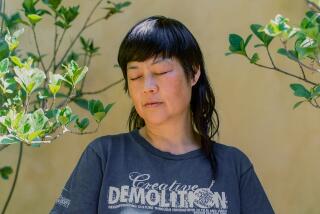Breathe Deeply and Think ‘Timeless Female Experience’
Mama walks in, bobbling a little in the middle, a thin rubber mat rolled under one arm. She takes off her shoes.
People ask, “How many months?”
Mama smiles.
“Six months,” she replies.
“Eight months,” she says.
“Eight-and-a-half months.”
Oh, Mama. She is something. In all her 26, 28, 33, 35 years, she has never felt or looked like this, or pondered the things she ponders all the time these days. It is puzzling and amazing, this new state.
Here at Golden Bridge Yoga, however, an almost uterine peacefulness prevails. Having come for a prenatal yoga class with a dozen-and-a-half others also growing headlong toward their first motherhood, Mama can relax some into her transformation.
And Gurmukh Kaur Khalsa, Mama’s teacher, knows from transformation. Beginning 57 years ago as Mary Mae Gibson in Downers Grove, Ill., she has evolved into a devout Sikh, a 30-year yoga teacher who counted among her students Madonna and Cindy Crawford when they were just as pregnant as Mama.
The classroom is a large V with a bare wood floor and walls of rough brick. On a raised stage before a large gong sits Gurmukh. She wears a white turban and a flowing white bana. Her voice is soft, like that of a contented child; a balm to her students.
Mid-city sunshine floods the room through large glass-block windows which strain the light of its dust and dizziness. Filtered away is all suggestion of the bleating cell phones, traffic-swamped SUVs and Byzantine business plans so familiar to Mama in that version of herself--as lawyer, actress, realtor, administrator--that she inexorably is morphing away from.
Gurmukh wants Mama to understand something: Although Mama may feel more at ease negotiating a deal than delivering a baby, her body is the perfect instrument for the latter. All she needs to do is get her mind out of the way.
Let’s face it: Mama of late has been feeling awkward and vulnerable out there in the world. She sees the way men look at her differently. She can’t help but notice the slenderness and poise of other women.
Mama looks around the room at the other Mamas. They sit splay-legged and large-bellied on their mats, speaking of water retention and epidurals. She watches their frequent trundlings to the restroom. Mama feels reassured. This is ancient, a company of women facing the timeless female experience.
Then, at Gurmukh’s bidding, Mama begins her exercises. She sits in the lotus position and rubs her palms together. She lifts her arms high to expand her rib cage and, Gurmukh says, create more space for the baby. She rotates slowly from the waist, arms slowly windmilling, graceful hands doing an aerial ballet.
Soles together, gripping ankles, Mama rocks back and forth on her lower spine, her eyes shut, breathing rhythmically and trying to “stay” in what Gurmukh calls the “instinctive, instinctual primal space” inside her.
Then, bent backward with feet and hands on the floor, Mama thrusts her belly upward like an offering. She gets on all fours and rotates her bottom un-self-consciously in the air.
She slowly kicks each leg behind her, then to the side, over and over. “Repetition will create patience,” advises Gurmukh, “and you will need patience in your birth and in motherhood.”
Mama rises to her feet and, bending over her bulge, touches the floor and walks her hands back toward her feet.
Mama and the woman nearest her grasp arms and do slow deep knee bends. Hands on each other’s shoulders, they point toes and kick legs back, 26 times. Spine to spine, they link arms and take turns bending each other backward. They massage each other’s shoulders.
Gurmukh slides a disc into a CD player and the room fills with the skirl of bagpipes. Mama and the others form two facing lines. Taking their turn, Mama and her partner join arms and sashay and skip and dance down between the lines. Their heads are thrown back, their open mouths fill with laughter.
The women face their partners and join hands high above their heads, forming what Gurmukh calls “the birth canal.” And Mama, bent low, makes her way down the middle, patting each protruding belly on either side of her as she goes.
Gurmukh bids her rest.
Mama goes to her mat and curls up on her side. She is in kindergarten again, a little girl during nap time. Gurmukh is telling her that the cutting of her umbilical cord in a couple of days, or weeks, or months, will leave a psychic connection that will bind her to her child for all time, no matter where on earth that child is.
Gurmukh begins slowly and quietly to stroke the gong. Her soft mallet summons it to life. For five minutes, the sound wows and shimmers and builds in waves, the overtones rising, joining and mutating, the mutations recombining in a mesmerizing wash.
Mama cradles her belly in her arms. Her eyes are closed and open. She is seeing not what is before her, but something more distant and much nearer. She lies there wondering.
*
James Ricci’s e-mail address is james.ricci@latimes.com


